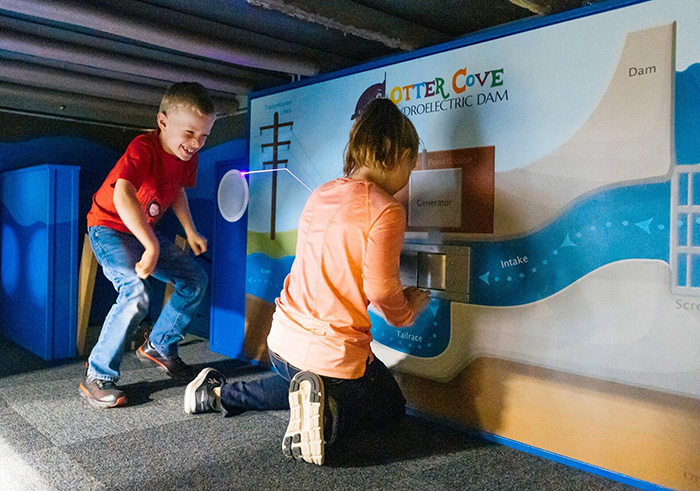Otter Cove Children’s Museum provides learning opportunities
News | Published on March 29, 2023 at 12:17am GMT+0000 | Author: Chad Koenen
0
Kids can have a fun time while learning about the topics of alternative, natural energy, food sources, whole foods and growing food at the Otter Cove Children’s Museum in Fergus Falls.
Children can learn about food sources, growing food at museum in Fergus Falls
By Benjamin Velani
West Central Initiative
Otter Cove Children’s Museum, in the heart of Fergus Falls, is a wondrously whimsical space adorned with vibrantly colored installations from several local artists, depicting local scenery and wildlife.
Katie Ganoe is the Executive Director of Otter Cove. “Implicit and explicit, throughout the museum, it’s about our physical environment—the landscapes of west central Minnesota,” Ganoe said. “You see it throughout the murals, commissioned by local artists like Jenny Field, and throughout the exhibits.”
“More implicitly, Otter Tail Power Company’s Discover Energy! exhibit aligned with our value of being responsible and taking care of each other,” Ganoe said. “Community—we all work together to get the job done. We all have a role to play in keeping our environment safe and healthy, both here at Otter Cove and out in the world.”
Jennifer Endris, who works closely with visiting kids and is lovingly known by them as “Miss Jenny,” added, “That fits in with leaving everything better than we found it. It’s a big thing we try to impress upon the children—to think about the next person or generation that comes along.”
In addition to energy-related experiential learning through the exhibits—including signage that explains the science behind wind, solar, and hydro-electric energy production—last year, the Science Museum of Minnesota offered a six-month facilitated program.
“Each month, we invited a local science teacher to lead those sessions,” Ganoe explained. “They were hands-on. They built their own solar farms. They created pinwheels to understand windmills. And they even did hydro-racing to learn how much force it takes to move objects in a pool.”
The sessions were about 20 minutes long and geared toward ages 6 to 10. They’re hoping to expand the programming this year with nine activities.
The value of the activities, Ganoe said, is that “at the root of it, play is how children learn. It’s how they integrate everything they’re observing. What are they hearing adults say? What are they seeing in the community and the news? Given the chance, they take those scenarios and practice them. At Otter Cove, they can control the situation, where they might not normally, and learn how to work out different social situations, peer-to-peer, in a safe space.”
Endris, who bears witness to more child-parent play than most, added: “Parents can learn what their child is worried or thinking about by watching them play. If you’re seeing an inexplicable behavior, it might provide insight and allow you to then have any necessary conversations with them.”
Otter Cove is focused on empowerment by way of knowledge. “In bringing up the topics of alternative, natural energy, food sources, whole foods, growing food, I’ve actually seen kids play out a food shortage ‘Oh! We’ll have to plant some more seeds because there’s no food at the grocery store!’” added Endris.
“I see these as the expressions of eco-anxieties,” Endris said, “things you wouldn’t think younger kids think about, but they do. Having that kind of safe, fun, spontaneous environment that’s constantly arming them with information, but not in a foreign way, empowers them to process any anxieties they may have about now or the future in a productive way with the proper support to be optimistic.”
Ganoe made it clear that “We have the opportunity, especially with children around the ages of five to nine, to engage a little more explicitly about their role as caretakers of the world, and how they can be a part of the solution.”
Reflecting on Otter Cove as a major social institution for Fergus Falls, Endris concluded: “The community they have within each other and here at the Cove motivates them to want to make an effectuated change to care about the next person that comes along. We strive to have that in our Cove culture of acceptance, inclusion, and responsibility for each other.”
Editor’s note: This story is reprinted courtesy of Benjamin Velani, the Lead for America Climate Fellow at West Central Initiative.

